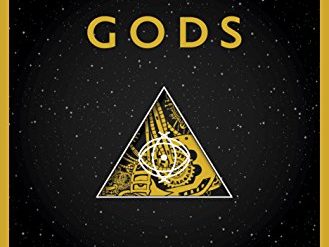
Most hard science fiction is about space travel, first contact, robotics, the multiverse, or some other topic that’s familiar to fans schooled in science. But here’s one that’s about paleontology, and what a revelation it is! Eugene Linden, who previously wrote more than a dozen nonfiction books about science, technology, and the environment, turns his attention to fiction in Deep Past. This tensely plotted and thoroughly enjoyable novel poses questions most scientists are loath to ask. For instance, why is it that homo sapiens is the only highly intelligent species ever to walk the Earth? Or are we?
Estimated reading time: 4 minutes
An unwelcome assignment in Kazakhstan
In Deep Past, Dr. Claire Knowland is a specialist in animal communication. Her “true passion” is the study of animal intelligence. She teaches at a prestigious New England liberal arts university, where she leads a team engaging in “experiments to determine what information elephants conveyed through ultrasonic communication.” Then, apparently because she’s impressed her colleagues with her skill as an administrator, her life is upended. The powers that be at the university assign her to take charge of a paleontology group working at a remote site in Kazakhstan. She’s to replace a scientist forced to leave because he’s ill. It’s an unwelcome assignment, on many levels, but Claire has no choice.
Deep Past by Eugene Linden (2019) 336 pages ★★★★★
A discovery of bones that are 5.5 million years old
Once on site in the inhospitable environment of northern Kazakhstan, Claire’s misgivings are richly confirmed. She’s assigned an intrusive handler by the government. Several members of her new team are openly hostile. And the group has come up with absolutely nothing of paleontological interest after two years of effort. Then, all of a sudden, the head of security at a nearby site where a mining consortium is exploring the potential for large-scale operations approaches her with a startling find. The head geologist at the mining site had uncovered what looks like ancient elephant bones—at a place where elephants had never before been found. Impossibly, the bones were 5.5 million years old!
Is homo sapiens the only highly intelligent species ever to walk the Earth?
Well, that’s just the beginning of Claire’s odyssey into the realm of high-stakes academic politics, high-level corruption, and superpower conflict. And in the middle of it all Claire falls in love with the Russian geologist who discovered the bones. The combination—well-grounded scientific speculation, a picture of “the ferocity with which science holds onto its paradigms,” and a love story—is hard to put down.
Notes from the author
Although the story in Deep Past may be hard to believe, it’s clearly based on demonstrable science. As Eugene Linden writes in an Author’s Note, “Claire’s background in studies of animal intelligence flows from my own investigations of the field over four decades.” He notes further in the Acknowledgments that “[t]he idea for this novel grew out of a simple thought: if the human race had died out 15,000 years ago, a million or so years from now, no successor intelligent species would have any evidence that a prior intelligent species had ever walked the planet.”
For related reading
You’ll find this book in good company on my post, 10 great medical and biological thrillers.
You might also be interested in Science explained in 10 excellent popular books.
For a completely different take on such large mammals, see Mammoth by John Varley (A novel about time travel featuring wooly mammoths and an eccentric billionaire).
For more good reading, check out:
- These novels won both Hugo and Nebula Awards
- The ultimate guide to the all-time best science fiction novels
- 10 top science fiction novels
- The top 10 dystopian novels
- Ten new science fiction authors worth reading now
And you can always find my most popular reviews, and the most recent ones, on the Home Page.



























